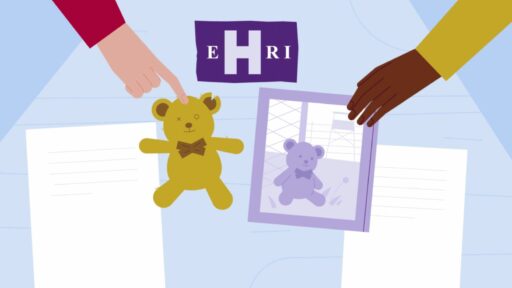What is the European Holocaust Research Infrastructure (EHRI)? Watch EHRI’s Mission in 90 Seconds

Watch EHRI’s Mission in a 90 seconds’ video
Modern, democratic Europe developed out of the ashes of Auschwitz. It is therefore crucial that research into the Holocaust continues to progress. Only thus can our history’s darkest chapter be reread and refined by new generations. For Europeans to understand this shared past, the endeavour must transcend national borders.
Trans-national Holocaust research, commemoration and education is the mission of the European Holocaust Research Infrastructure (EHRI), and its main challenge is the wide dispersal of sources and expertise across many institutions. EHRI overcomes such fragmentation by connecting sources, institutions and people. The EHRI Portal enables online access to information about Holocaust sources, no matter where they are located. The Conny Kristel Fellowship gives researchers access to the resources of the world’s twenty leading Holocaust archives. EHRI’s extensive programme of networking and training brings people together. Last but not least, EHRI promotes innovative tools that advance the digital transformation of Holocaust research.
Although EHRI’s primary impact is scientific, it also advances a wider social and political agenda. The recent rise of antisemitism, xenophobia and aggressive nationalisms demonstrate that Holocaust research is never a purely academic concern, but a prerequisite for open and non-discriminatory societies across Europe and beyond.
EHRI-Implementation Phase (IP) project>
Watch EHRI’s Mission in 90 seconds:
EHRI-IP Project (Implementation Phase)
The EHRI Implementation Phase project (EHRI-IP) will run from February 2024 – January 2026. EHRI was added to the European Strategy Forum for Research Infrastructures (ESFRI) Roadmap in 2018 and has been transforming itself from a project into a permanent organisation that will help secure the future of trans-national Holocaust research, commemoration and education. EHRI has become an European Research Infrastructure Consortium (ERIC) in January 2025 and is undertaking all the necessary legal, financial and strategic work to have this permanent organisation fully operational by the end of the implementation phase.
EHRI-IP is coordinated by NIOD Institute for War, Holocaust and Genocide Studies, Amsterdam.
EHRI-IP is funded through Horizon Europe.
EHRI is an ESFRI project.

